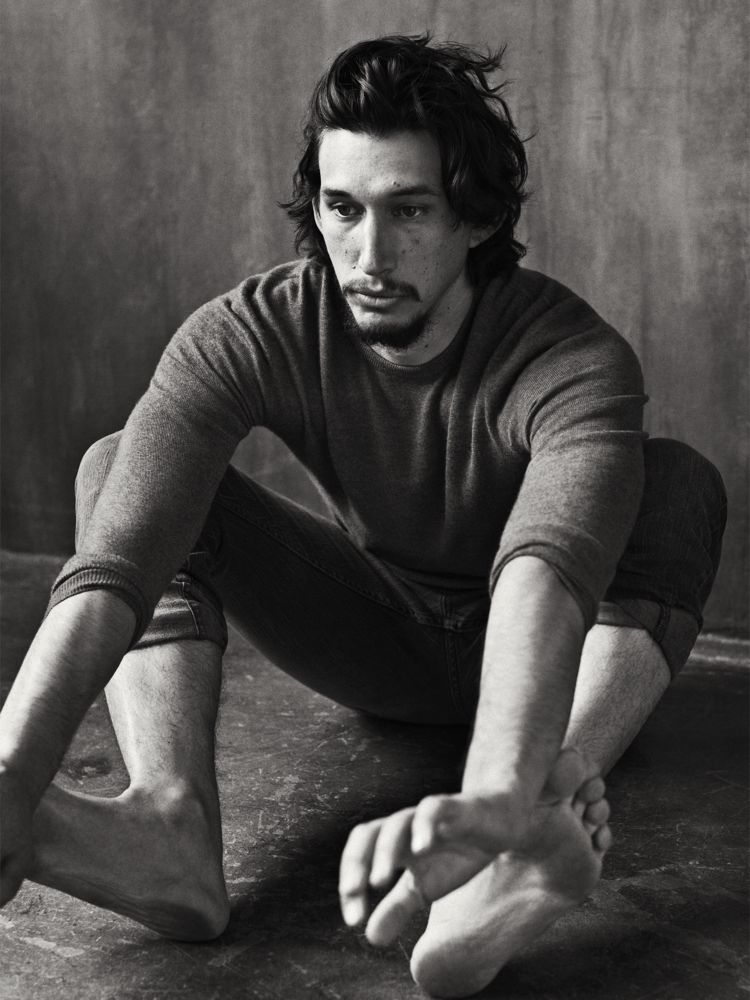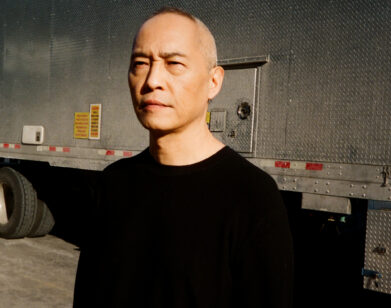Adam Driver
“I SAW THE PILOT FOR GIRLS ABOUT SIX MONTHS BEFORE IT AIRED. I WATCHED IT WITH LENA ON HER LAPTOP AND I WAS LIKE, ‘NO . . . I CAN’T DO THIS.’ ADAM DRIVER
“I don’t feel like I have to dress up to go to the deli,” says Adam Driver sheepishly while eating broccoli soup in a restaurant near his Brooklyn Heights apartment. At 6’3″—and as one of the main dudes on the HBO bourgeois-bohemian comedy Girls—Driver has become easily recognizable in his neighborhood, not to mention a hipster sex symbol. Over the course of the show’s two seasons, his character, whose name is also Adam, has played object of obsession, frequent booty caller, emotional boyfriend, and dejected ex to Lena Dunham‘s Hannah. “He does so many aggressive things,” the 29-year-old Driver says. “To make him human is a challenge.”
Raised in Mishawaka, Indiana, Driver enlisted in the Marines after high school. (He was honorably discharged after two years for a dislocated sternum.) Then it was on to Juilliard—his first lodging was sleeping in a closet in his uncle’s house in Hoboken, New Jersey—and then the New York stage. “It definitely helped,” says Driver of the usefulness of his military experience as he embarked on a life of thespianism. “The time management, discipline, and taking direction . . . Knowing it’s not all about you. You’re one part of a huge thing trying to be accomplished.”
In addition to Girls, which just wrapped its second season, Driver will soon appear in both Noah Baumbach’s Frances Ha, a scrappy black-and-white film about a hopelessly offbeat dancer (played by Greta Gerwig, who also co-wrote the script), and the Coen brothers’ Inside Llewyn Davis, about the ’60s Greenwich Village folk scene. Driver also just signed on to play the lead in the 18th-century period piece The Coward, in which he will portray a nobleman who ditches the patrician life to avoid a duel—a far cry from Driver’s gung-ho spirit. But in even the smallest of turns, Driver displays the utmost conviction. His brief performance as a telegraph operator in last year’s Lincoln illustrates the exacting care that he puts into every role. “I studied Morse code,” Driver says. “I made flashcards, the whole deal . . . And then when I got there, they had the sound guy do it!”
WILLIAM VAN METER: I’m geeked about Frances Ha. Greta Gerwig is sort of like the “actors’ actor.”
ADAM DRIVER: I had an amazing experience working on it. I was involved in a play at the same time, so I’d rehearse the play during the day and go shoot the movie all night. I remember a very specific moment when we were filming in someone’s apartment in Brooklyn and they needed to bounce some lights to get the shot, and people were literally holding up their white T-shirts to bounce light. That film was definitely made on a dime.
VAN METER: It seems like you’d be a grouch having to do a play and a film at the same time.
DRIVER: [laughs] No, no, it was great. Noah and Greta and the crew were so exciting to work with. In a way, it was also really great to be so exhausted. And since I didn’t have the script, I didn’t have any specific ideas ahead of time of what I wanted to put on top of a scene. We were all responding to what was happening right then. Interesting things always come from being really exhausted and really sick. Noah is so particular about the language that he wrote. He’s like, “It’s ‘they’re,’ not ‘they are.'” That was freeing, just like working on Girls is freeing in completely the opposite way.
VAN METER: So having constraints made something more liberating?
DRIVER: Noah was just setting the boundaries, which was more than fine with me. On Girls, we have the freedom to kind of add things that we feel in the moment. It’s just a different way of working.
VAN METER: In one of the Frances Ha trailers, you’re walking around in a towel. You’re kind of like a funky hipster version of Charlotte Rampling in that you’re always ready to take off your clothes.
DRIVER: [laughs] I haven’t seen that trailer.
VAN METER: How’s everything on Girls? I watched Season One, but I don’t have cable so I haven’t seen Season Two yet. What’s happening with Adam?
DRIVER: I’d say my character is surprised in himself. In the first season, he makes these bold statements like he knows what’s right, like he has a code of ethics that he’s following. In this season, a big difference is that he’s surprised by the way he feels: in his relationship with Hannah, being in a new relationship, and how the different sides of him that he’s not really aware of are brought out with just a different energy coming at him. I don’t have cable either and I also haven’t seen it yet.
VAN METER: Do you not like to watch what you’re in?
DRIVER: I can’t help but watch something and nitpick all the mistakes and then replay them over in my head for months afterward, and not only drive myself crazy, but everyone I’m around crazy, too. I almost feel like an egotistical prick. Take Lincoln, for example. Obviously Lincoln is not about the telegraph operator. There’s a whole other movie before and after the two isolated scenes that I’m in. And even on Girls, it’s not like I’m supporting everyone else that’s in it. I think it’s a thing I just have to get over, but for now I keep noticing all the problems that I want to fix. And I know what it feels like to play it, so I’m not so interested to see what it looks like.
VAN METER: Have there been any performances in particular that you’ve torn yourself apart over?
DRIVER: I saw the pilot for Girls about six months before it aired. I watched it with Lena on her laptop in her apartment and I was like, “No . . . I can’t do this.” I kept replaying it in my mind, overanalyzing things in a way that I didn’t think was helpful. So I said, “If this is going to continue to go forward, I don’t really want to know how it’s being translated, what shots actually make it in there.” I’ve been lucky to work with a bunch of people who I totally trust and surrender that kind of stuff to. And that’s not really my job to make those calls at the end of the day. I totally trust Lena and Jenni Konner and Judd Apatow in making those calls.
VAN METER: You seem to mostly work in New York, right? Are you ever out in L.A?
DRIVER: I don’t go out to L.A. much. We had to go for the Emmys and the Golden Globes. I had fun at the Golden Globes, actually. I feel like I went with a chip on my shoulder, thinking it was going to be weird, and it was really kind of amazing—more intimate and the people were more relaxed. We were on the tier just above, in the middle, so I was looking down at all the people who I had grown up watching in movies and television, who were very inspiring. But I feel like I’ll never get over red carpets. They’re so bizarre and awkward. People are always like, “Who is this?” And someone will say, “Adam Driver.” And they’ll be like, “Adam! Move! Get out of the way, you’re blocking the shot!” For somebody else who’s better . . .
VAN METER: Now that’s shady.
DRIVER: At the Golden Globes, it was more awkward because no one knew who I was at all, so they didn’t even take my picture. They’d just put their cameras down and look at me and I’d look right back at them and wait to go down to the next group of people who had no idea who I was.
VAN METER: I’ve never read about you getting out of a car inappropriately or stealing anything . . . You seem to have your head on your shoulders.
DRIVER: Probably because I don’t go out much. If I went out more, I would steal things.
VAN METER: I know you don’t like to talk about personal stuff, but I do know you like Japanese food and have a significant other because I saw you and your girlfriend at [East Village Japanese restaurant] Sobaya. Do you go to the same restaurants over and over and get the same thing to eat each time?
DRIVER: I eat the same foods, yeah. I eat my traditional breakfast. I eat six eggs with one yolk and two pieces of turkey, coffee, and a couple bowls of cereal.
VAN METER: Turkey bacon?
DRIVER: No, smoked turkey.
VAN METER: Oh, wow. Like you smoke one turkey a week and then you slice a bit off of it every day until it’s time to put another one in your smoker or rotisserie?
DRIVER: No, I buy the packages.
VAN METER: So what are you doing for the rest of your day?
DRIVER: I’m going to D.C., and then to Tennessee, and then San Diego. My friend Bryan [Doerries] has a project [Theater of War] where he does readings of selected scenes of Greek plays—Sophocles’s Ajax and Philoctetes—for military audiences to spur a conversation about PTSD. And I have this nonprofit, Arts in the Armed Forces. We just had a big fundraiser. I do Bryan’s project a lot, and he’s on the board of our projects, and we trade resources. Ours is more contemporary—it’s thought-provoking troop entertainment—and Bryan’s is more of a social service.
VAN METER: That sounds so immediately fulfilling. It’s one thing to do theater, but it’s another thing to do it in such a personal venue with these military guys back from the front lines.
DRIVER: I’m conflicted with theater in the city because you want to reach a diverse audience, and that audience doesn’t typically go to the theater. So I feel like that’s a really exciting response and it sort of spurs a conversation as opposed to the people you see at the theater a lot—I mean, I believe in the power of theater, but sometimes it just seems like recycled air when you’re performing for the same group of people. Acting is a business and a political act and a craft, but I also feel like it’s a service—specifically, for a military audience. To feel like I can continue my service, that’s always gratifying in the midst of all this seemingly crazy bullshit. You know, acting, believe it or not, can get very self-involved! I feel fortunate to have been able to work on things with people who have a very specific point of view and perspective, and who feel like they’re doing something very active. Girls feels very active and stirring a conversation and controversial, and you can’t really ask for more as an actor. Working on things that start that conversation is pretty exciting.
WILLIAM VAN METER IS A NEW YORK-BASED WRITER.







